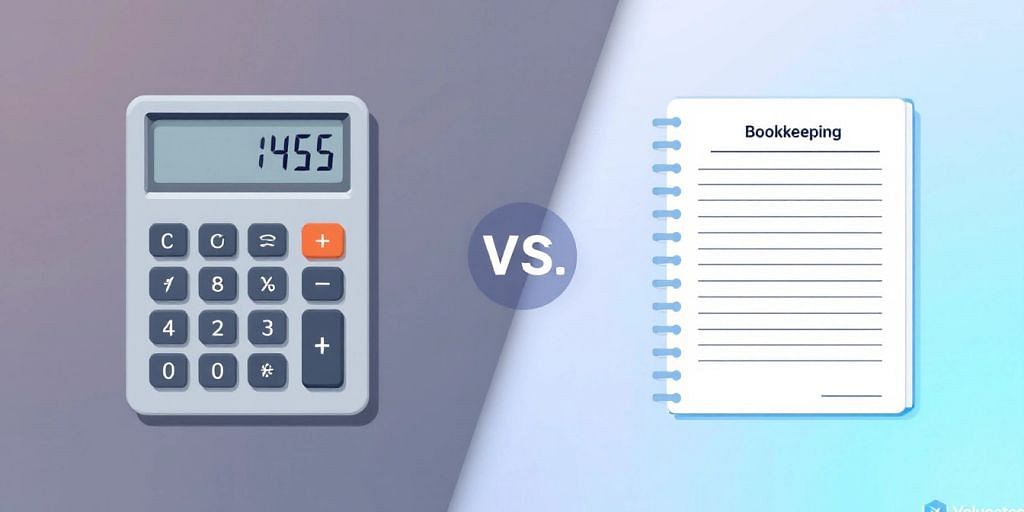
Understanding the Difference Between Accounting and Bookkeeping: A Comprehensive Guide
Back To BlogKey Roles and Responsibilities
Daily Tasks of a Bookkeeper
Bookkeepers are the unsung heroes of our financial world. They handle the daily grind of recording transactions, which includes:
- Managing accounts receivable and payable
- Ensuring timely invoicing
- Reconciling bank statements
Without their meticulous attention to detail, our financial records would be a chaotic mess. They keep everything organized, making sure that all transactions are recorded in the right accounts. This role is essential for maintaining accurate financial records, which is crucial for any business.
Daily Tasks of an Accountant
Accountants take things a step further. They analyze the data that bookkeepers provide and focus on:
- Preparing financial statements
- Conducting audits
- Offering strategic advice for future planning
They ensure that our financial statements are accurate and comply with regulations. Their insights help us make informed decisions about our business's future.
How Bookkeeping Supports Accounting
Bookkeeping is like the foundation of a house; without it, the structure would collapse. Accurate bookkeeping provides the necessary data that accountants rely on to:
- Analyze financial health
- Prepare tax returns
- Make strategic business decisions
The Importance of Each Role
Both bookkeepers and accountants play vital roles in our financial ecosystem. While bookkeepers focus on the day-to-day tasks, accountants provide the analysis and insights needed for long-term planning. Together, they ensure that our financial operations run smoothly and efficiently.
In the world of finance, understanding the difference between bookkeeping and accounting is key to making informed decisions and ensuring compliance with regulations.
By recognizing the unique contributions of each role, we can better appreciate how they work together to support our business goals.
Skills and Qualifications Needed
Educational Requirements for Bookkeepers
To become a bookkeeper, we usually need at least an associate degree or a certificate in bookkeeping or accounting. This gives us the basic knowledge to handle financial records accurately. While formal education isn’t always required, having a solid foundation helps us avoid mistakes.
Educational Requirements for Accountants
On the other hand, accountants typically need a bachelor’s degree in accounting or a related field. This education prepares us for more complex financial tasks and responsibilities. Some accountants also pursue advanced degrees for better job opportunities.
Certifications and Training
Certifications can boost our credibility in both roles. For bookkeepers, getting a Certified Bookkeeper (CB) designation can be beneficial. Accountants often aim for certifications like Certified Public Accountant (CPA) or Certified Management Accountant (CMA). These certifications require passing exams and meeting specific educational criteria.
Continuing Education
In both fields, continuing education is important. We need to stay updated on financial regulations and software changes. Many professionals take courses or attend workshops to keep their skills sharp. Staying informed helps us provide better service to our clients.
Summary
In summary, while both bookkeepers and accountants play vital roles in managing finances, the skills and qualifications needed differ significantly. Bookkeepers focus on daily transactions, while accountants handle more complex financial analysis and reporting.
Understanding these differences helps us choose the right professional for our business needs.
Whether we’re looking to manage daily finances or analyze overall financial health, knowing the right qualifications can guide us in making informed decisions.
Tools and Techniques Used

Common Bookkeeping Tools
When it comes to bookkeeping, we often rely on a few key tools to keep everything organized. Here are some of the most common ones:
- Spreadsheets: Simple and effective for tracking expenses and income.
- Accounting Software: Programs like QuickBooks or FreshBooks help automate many tasks.
- Receipts Scanners: These tools help us digitize and store receipts for easy access.
Common Accounting Tools
For accountants, the tools can be a bit more complex. Here’s what we typically use:
- Advanced Accounting Software: Tools like Xero or Sage offer more features for financial analysis.
- Financial Reporting Tools: These help us create reports that show the financial health of a business.
- Tax Preparation Software: Essential for ensuring compliance and maximizing deductions.
Software Solutions
In today’s world, software solutions are a game changer. They help us save time and reduce errors. Here’s a quick look at some popular options:
Manual vs. Automated Processes
We often debate whether to go manual or automated. Here’s a quick breakdown:
- Manual Processes: More control but can be time-consuming.
- Automated Processes: Save time and reduce human error, but may require initial setup.
In our experience, finding the right balance between manual and automated processes can lead to better efficiency and accuracy in financial management.
Impact on Business Decision-Making

How Bookkeeping Data is Used
When we think about how bookkeeping data impacts our business decisions, it’s clear that it provides a solid foundation. Accurate records help us track our daily transactions, which is crucial for understanding our cash flow. Here are some ways we use this data:
- Monitoring expenses to identify areas for cost-cutting.
- Tracking sales trends to make informed inventory decisions.
- Preparing for tax season by having all financial records in order.
How Accounting Data is Used
On the other hand, accounting data takes things a step further. It helps us analyze our financial health and make strategic decisions. For instance:
- We can assess profitability through detailed financial reports.
- It aids in budgeting and forecasting future financial needs.
- We can evaluate investment opportunities based on financial performance.
Examples of Business Decisions
Both bookkeeping and accounting data lead to important business decisions. Here are a few examples:
- Deciding whether to hire more staff based on cash flow analysis.
- Choosing to invest in new equipment after reviewing profit margins.
- Planning for expansion by analyzing past financial trends.
The Role of Financial Analysis
Finally, financial analysis is where the magic happens. It combines data from both bookkeeping and accounting to give us a complete picture. This analysis helps us:
- Identify strengths and weaknesses in our financial strategy.
- Make informed decisions about future investments.
- Understand market trends that could affect our business.
In summary, both bookkeeping and accounting play vital roles in shaping our business decisions. By leveraging accurate data, we can navigate our financial landscape more effectively and make choices that drive success. Bookkeeping is the backbone of our financial management, ensuring we have the right information at our fingertips.
Frequently Asked Questions
What is bookkeeping and why is it important?
Bookkeeping is the process of keeping track of all the money coming in and going out of a business. It’s important because it helps businesses know how much they earn and spend, which is key for making good financial choices.
How do bookkeeping and accounting differ?
Bookkeeping focuses on recording daily financial transactions, while accounting involves analyzing and interpreting that data to help make financial decisions.
Do I need a bookkeeper or an accountant for my business?
It depends on your needs. A bookkeeper is great for keeping daily records, while an accountant can help you understand your finances better and make strategic decisions.
